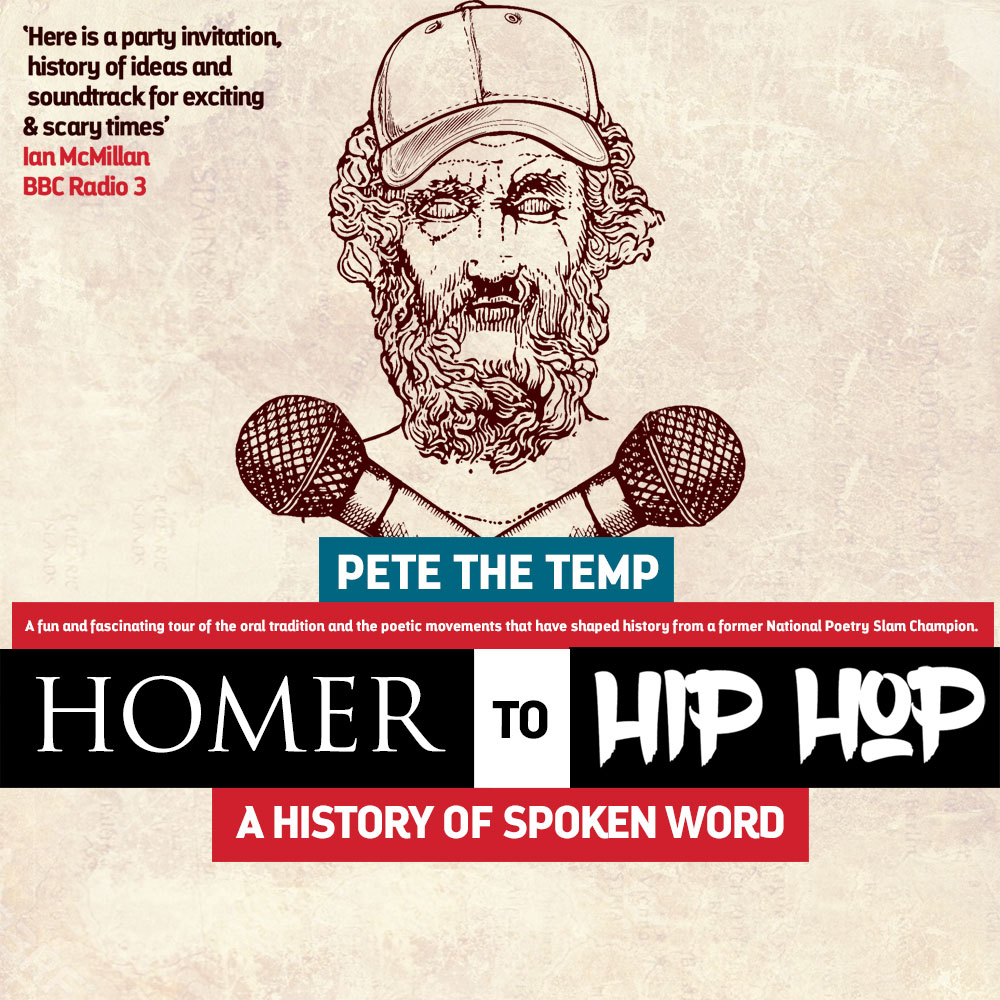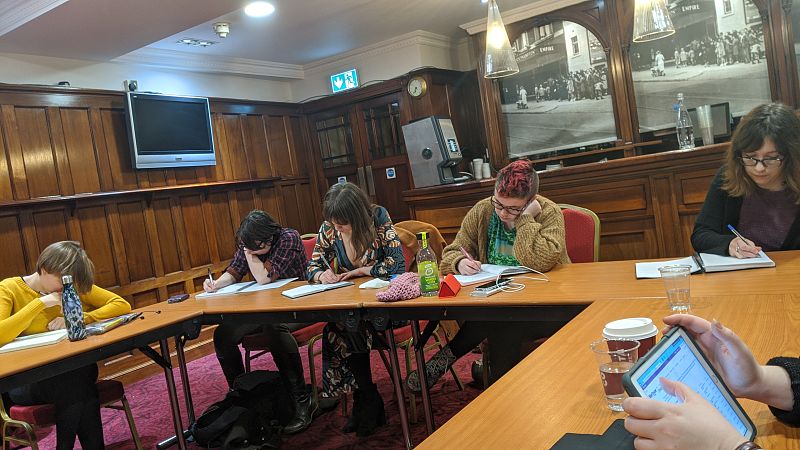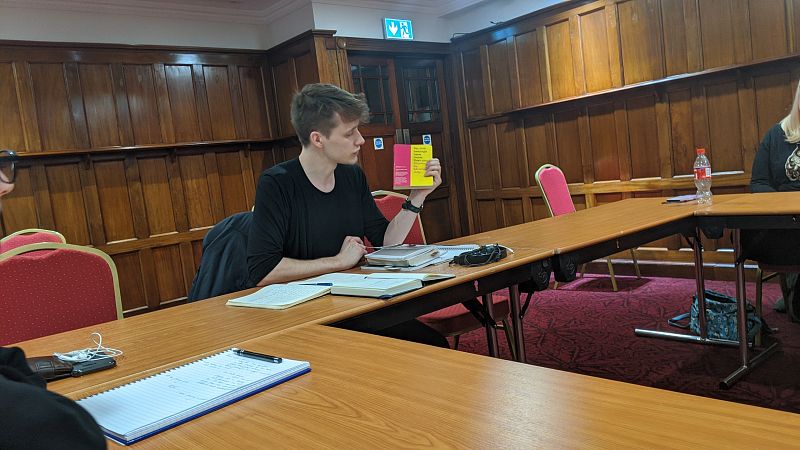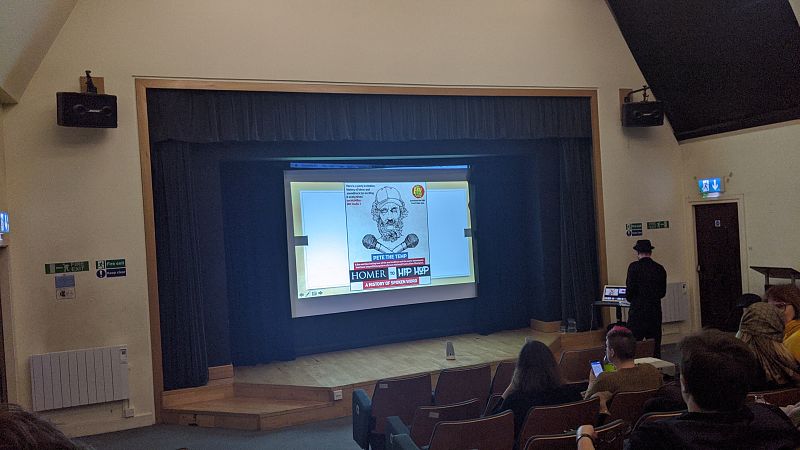03 February 2020
Posted by Matt L T Smith

Frozen Lakes and 300,000 Years of Oral Tradition
For this week’s session we jumped in by going around the group and saying our most ideal and most unideal ways of being woken up. Ideal ways proposed by the group ranged from: Being woken by someone applying more sunscreen, “the smell of avocado toast,” being “really aware that someone I know and trust is going about their day,” “woken up by someone I love with a bagel, in the carribean,” and being woken up by “touching.” Some unideal ways of being woken up included: Being “woken up to an unplanned house party” (which apparently happened to one poor writer this week!) “the sound of sirens,” “the alarm goes off and the devil telling me it’s the weekend,” and being “woken up by neighbours cupboards.” We wish for nothing, but the most gentle of wake up calls for our writers going forward!
In our exercise for today we looked at Selima Hill’s poem ‘Thickly-frozen Lakes’ from her collection Jutland. Antosh first tasked our writers to write down each line of ‘Thickly-frozen Lakes’ as he read them out, to get a real sense of analysing the short four line poem and absorbing it by copying it out. Then writers discussed in pairs what they thought about the poem.
Thickly-frozen Lakes
Like blocks of ice on thickly frozen lakes
creaking as they readjust themselves,
my father can be heard behind the door
adjusting to my presence in the bathroom.
When it came time for group discussion there were ruminations on the father, that the juxtaposition with the image of the ice suggests that the father is “cold.” One writer pointed out that since the father had to “readjust” to her presence it suggested that the father was no longer used to having her in his space. The group discussed that there was a sense of the father as “solid like a rock” a firm presence in his frozeness. They discussed how the creaking not only gives an impression of the father, but also evokes the sounds of a house settling.
The next task was to freewrite using ‘Thickly-frozen Lakes’ as a prompt, and as Selima does start on an image then connect that image to something else breaking the freewrite into image and subject. In checking in after the freewrite our writers talked about the challenge of tying image and subject together “What does this mean? How do I connect it?” and some found “doing it backwards” starting with subject then finding an image was another way into the exercise. Space was also opened up for writers to share their freewrite, if they wanted, and we had a very touching reading from Harley this week. I’m really looking forward to hearing more from our writers as we go forward.
The group discussed editing their pieces from the first week and how “abandoning stuff is also editing,” as one writer had moved on from the piece she constructed last week, but used it as the fuel and a springboard to begin something new entirely. We had ruminations on editing to the frustration of “why can’t I touch this?” when it comes to a freshly written piece to what it feels like to go back and edit something old, the balance between maintaining a narrative and staying true to what was originally written whilst adding in new parts.
We wrapped up at the Mayflower for the day, but the session wasn’t over yet as the Mayflower Creative Writers group was going on a field trip! We headed over to a ‘Later at the Library’ talk at Southampton Central Library from Pete the Temp (aka Pete Bearder) taking us on a journey through 300,000 years of the oral tradition (give or take!) From town criers, to freestyle rappers, from the bards of old, to the Harlem Renaissance, we learned the power of, as Pete puts it, being “a little bit gobby.” Here’s us looking forward to hearing some more gobbyness from our writers in the future!
Our writers writing!

Antosh showing off our reading for next week: Miranda July

Homer to Hip-Hop.

Archive
Junior & Young Writers Week 3: Return From The Magical World
Junior & Young Writers Week 2: African Mythology
Problems, Problems, Problems...
Cautionary Tales & Christmassy Opening Lines
You've Gotta Have Pace, Pace, Pace
Junior & Young Writers Week 1: Alien Encounters
Junior & Young Writers: Week 5 - Play on Words Pt. 2
Junior & Young Writers: Week 11 - end of term showcase [build a bard workshop]
Junior & Young Writers: Week 10 - Greek Theatre - chorus stories
Junior & Young Writers: Week 9 - Greek Origin Stories - Spring
Rubber Ducks & Writing Festivals
Junior & Young Writers: Week 7 - Greek Hero Stories [the 12 labours of Hercules]
Junior & Young Writers: Week 12 [Wild Words] - Stuff & Things
Junior & Young Writers: Week 11 [Wild Words] - World Building 2
Junior & Young Writers: Week 10 [Wild Words] - World Building
Junior & Young Writers: Week 9 [Wild Words] - Mystery & Choose Your Own Adventure
Junior & Young Writers: Week 8 [Wild Words] - Spooky Sequels & Potion Poems
Junior & Young Writers – Week 10 (Writers’ Inspiration) – Final Showcase
Junior & Young Writers – Week 9 (Writers’ Inspiration) – Editing & Performance Tips
Junior & Young Writers – Week 8 (Writers’ Inspiration) – Cuteness
Time goes on by Tavinder Kaur New
Junior & Young Writers – Week 7 (Writers’ Inspiration) – Natural Solutions
Junior & Young Writers – Week 6 (Writers’ Inspiration) – The Language of Fruit and Veg
Junior & Young Writers – Week 5 (Writers’ Inspiration) – Adventures In Space
Tinklebobs and Bedraggled Angles
Junior & Young Writers – Week 4 (Writers’ Inspiration) – Our Environment
Fortune Tellers & Future Letters
Junior & Young Writers – Week 3 (Writers’ Inspiration) – Home
Young Writers - Week 10 (The Art of Writing) – Final Week Showcase
Junior Writers - Week 10 (The Art of Writing) – Final Week Showcase
Young Writers – Week 9 (The Art of Writing) – Choose Your Own Adventure
Junior Writers – Week 9 (The Art of Writing) – Choose Your Own Adventure
Young Writers – Week 8 (The Art of Writing) – Sequel Stories
Junior Writers – Week 8 (The Art of Writing) – Sequel Stories
Young Writers – Week 7 (The Art of Writing) – Picture Prompts
Junior Writers – Week 7 (The Art of Writing) – Picture Prompts
Young Writers - Week 6 (The Art of Writing) - Script-writing & Dialogue
Junior Writers - Week 6 (The Art of Writing) - Script-writing & Dialogue
Junior Writers – Week 5 (The Art of Writing) – Poetry
Young Writers - Week 5 (The Art of Writing) - Poetry Potions
Edward The Martyr - A Competition!
Mood Boards and Postcards from Space
Young Writers - Week 3 (The Art of Writing) - PLOT
Junior Writers - Week 3 (The Art of Writing) - PLOT
Moomin Stories and Hollywood Pitches
Young Writers - Week 2 (The Art of Writing) - Genre & Setting
Junior Writers - Week 2 (The Art of Writing) - Genre & Setting
Prompts, Dialogues, and Cliché
Story Structure Part One: Exposition and Beyond...
Young Writers - Week 1 (The Art of Writing) - Character
Junior Writers - Week 1 (The Art of Writing) - Character
Young Writers - week 4 - Nature Writing [animals & wildlife]
Junior Writers - week 4 - Nature Writing [animals & wildlife]
Young Writers - week 3 - Nature Writing [trees/plants/flowers]
Junior Writers - week 3 - Nature Writing [trees/plants/flowers]
Young Writers - week 2 - 'fractured fairy tales'
Junior Writers - week 2 - 'fractured fairy tales'
Young Writers - week 1 - 'from deep inside a forest'
Creating Communities through Writing
WORDCUP - Hounsdown Session #6
Making pillows in a house full of feathers
WORDCUP - Hounsdown Session #5
Exploring home – a place, person, house
WORDCUP - Hounsdown Session #4
Stories From Our Streets at the Abbeyfield Wessex Society Reminiscence Session at Poole Library
What Do You Really Mean? Writing Dialogue for Scripts
WORDCUP - Hounsdown Session #3
Character Building & Murder Mysteries
Going inside – from a spark to a story
WORDCUP - Hounsdown Session #2
Maybe I Can Be Invisible After All... Monologues
Creative Writing: Fun Facts, Diverse Voices and Different Perspectives
Writing Competition - Stories From Our Streets
Stories From Our Streets Community Activity Pack
Thinking in-quiet, after the fire
Found Cities, Lost Objects: Women in the City Curated by Lubaina Himid CBE
Ekphrastic Jukebox - Writing to Music
ArtfulScribe LitFest Community Showcase 2023
Young writers exercise their creative power
Writing to The Sorcerer's Apprentice
The Mousetrap - Mayflower Young and Junior Writers Investigate Mystery!
Stories From Our Streets Launch!
Interview: In Conversation with Dr Victoria Leslie
The Missing Farmer/ Blackout Poetry & DADA
Exploring this wonderful World
Using props to create characters/ working as a writing room
Stories of the Dust and Character Questions
Storytelling and Escalation or Rising Action
Junior Writers Club Acrostic Poem
Notes on Intention for MAST Collective - Year 3 - Facilitation Focus
Earthquakes & Dominoes - MAST Collective Blog #4
SUPER MARIO AND POP CULTURE POEMS
Receptionists & Inky Voids - MAST Collective Blog #3
Saying No and saying YES on National Poetry Day!
There's a Dragon in the Wardrobe...
House Warming Party (The Mortifying Ordeal of Being Known) - MAST Collective Blog #2
Intern Blog 5 - The Publishing Process
POEMS TO SOLVE THE CLIMATE CRISIS
On The Streets With Theresa Lola
Intern Blog 4 - The Internship Journey
NEW DIRECTIONS, STARTING SMALL - THE ORWELL YOUTH PRIZE
LIGHTHOUSES, HOPE AND METAPHORS
on workshop and transformations: frogs, lions, and the duck that becomes a larder...
Poetry Ambassadors - Interview with April Egan
Intern Blog 1 - Finding a Voice
World Poetry Day: Fluffypunk and the Invisible Women
On Being a Writer: A Conversation by Beth Phillips & Sam Morton
Poetry Ambassadors - Interview with Kaycee Hill
UNHEARD VOICES: INTERNATIONAL WOMEN'S DAY, AND STORIES OF CONFLICT













